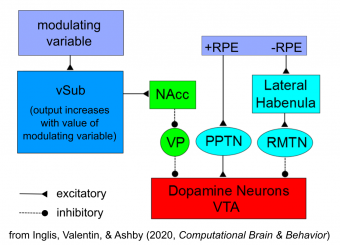
Dopamine and Positive Mood
In 1999, Dr. Ashby proposed a novel neurobiological theory predicting that events that elicit mild positive mood cause dopamine levels in frontal cortex to rise for a period of 20 -- 30 minutes, and that these elevated dopamine levels improve a variety of cognitive functions, including creative problem solving and working memory (Ashby, Isen, & Turken, 1999, Psychological Review). This was the first paper to tie cognitive effects of positive mood to dopamine (now a widely accepted view), and it was one of the first papers in the burgeoning new field of social neuroscience.

